We Completely Changed How We Drink in a Week. Can Bars Keep It Up as the Money Wears Away?
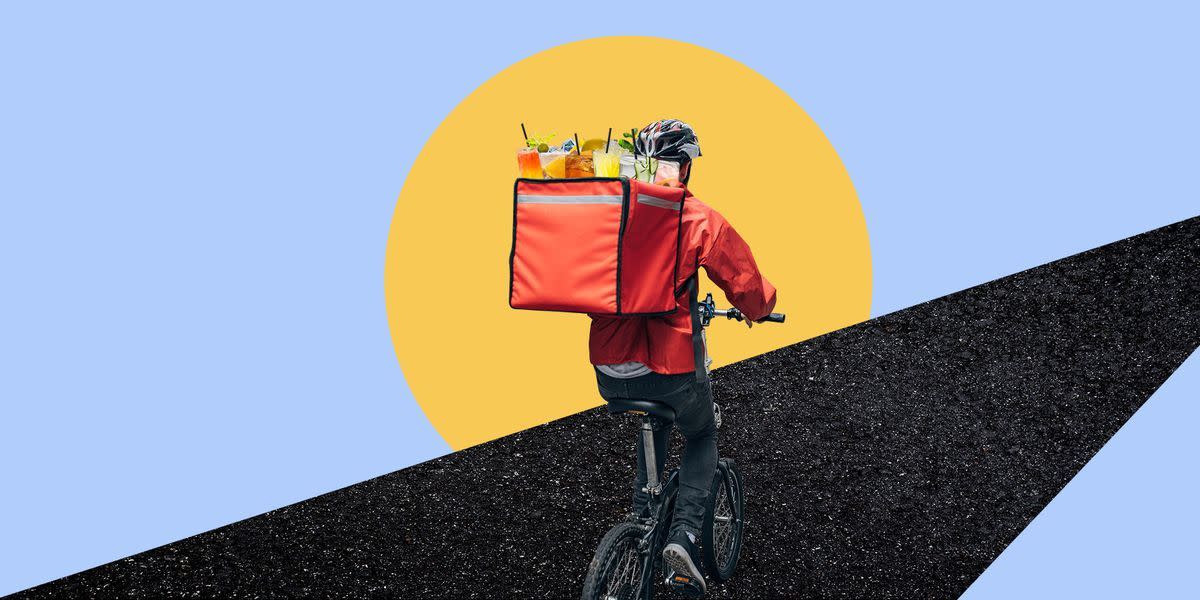
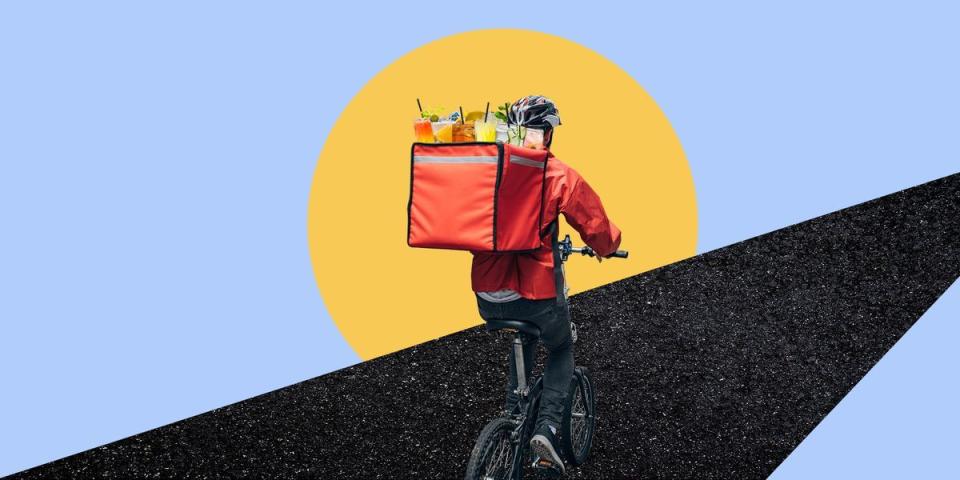
Bars look smaller when the sky is dark and the lights within are the same. Even more so when there’s a metal shutter pulled down over the windows, like a unopenable garage door. That’s what I noticed on a recent walk through my Brooklyn neighborhood days after many of New York City’s bars and restaurants shut down for good—all the places that beckoned on pre-pandemic weekends for an after-work beer or last call cocktail look so little now that they’re empty.
But across this city and the others hit hard by coronavirus there is still plenty to imbibe, if you know where to go. After all, we’ve still got to—need to, you might say, given the circumstances—have someone pour us a drink. In the last week, in which we all aged 40 years, nearly a third of the country started living in a city or state with a shut down order. Bars and restaurants have been deemed non-essential unless they had some apparatus for delivery and takeout. Many chose to close altogether, laying off employees even though they were loathe to do it, sometimes sending out a plea and a Venmo screen name to their regulars over social media to scrape together final funds before turning off the lights, pulling down the shutters, and hunkering down for however long this haul lasts.
But the joints that could about-faced, scrambling to serve out a bit of levity to all of us as long as they can bring in enough money to do it, as we in self-isolation buy up dried goods, sink into movie marathons, and accept monotony as a companion. Sure could use a margarita now, huh?
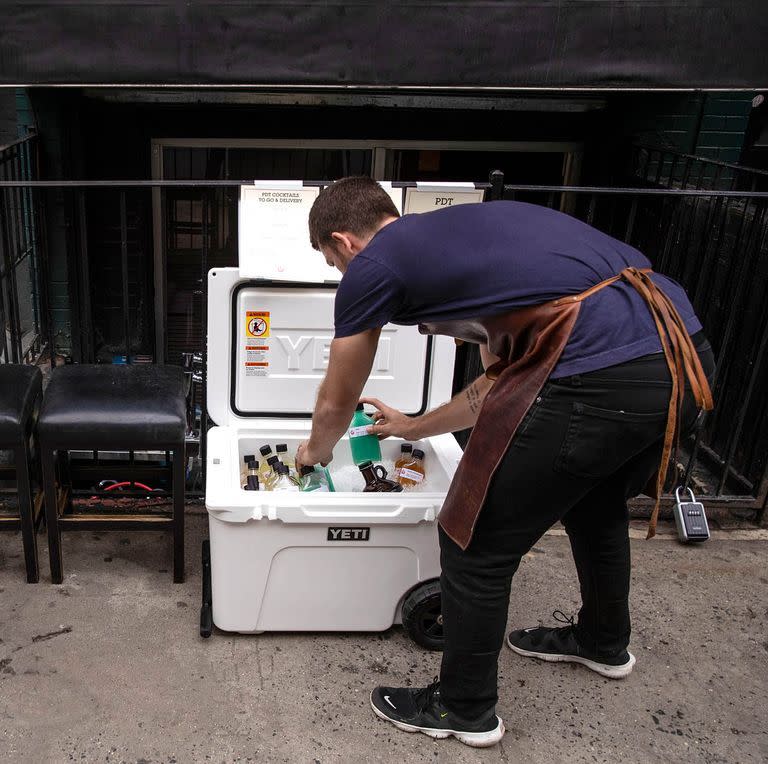
“I don’t want to say that we’re doing a service to the community—you know, we’re making cocktails—but we’re doing something in a time of need, and it feels kind of nice,” Jeff Bell of the renowned Please Don’t Tell (PDT) in New York’s East Village told me last Monday, minutes before his speakeasy-style bar became one of the first in the city to start selling pre-batched cocktails to go. They’d had a head start: That same Monday, New York City forbade bars and restaurants from allowing patrons inside to prevent the virus from spreading. However, they could still fill delivery and take-out orders for food, and in a wonderful relaxation of liquor laws, the state also allowed them to pair that delivery and take-out food with alcohol.
PDT quickly became a makeshift take-out cocktail stop—"like a lemonade stand,” Bell said, with bar snacks. Everyone on the team started batching and prepping who was willing and able. “One guy, of course like a true bartender, waited until today to buy groceries for his house,” Bell said. “He’s like, ‘Dude, I don’t have any groceries.’ Well then go home and buy as much beans and things like that that you can and go take care of yourself. This is for the people who’ve taken care of themselves, now we’re taking care of other people.”
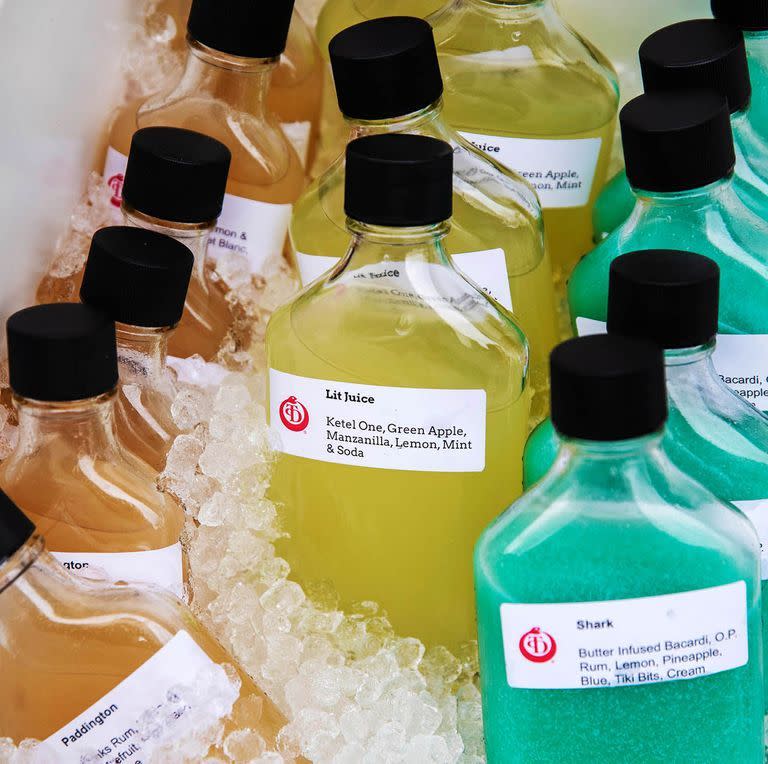
They took stock of the fresh ingredients they didn’t want to spoil and crafted cocktails from those, packaged them in single-serve bottles and kegs, and waited for New Yorkers to bite. They had the supplies to serve 1,000 drinks—on a non-pandemic night, PDT serves about 300 cocktails to order—and no idea if the gambit would work. But beyond providing New York Benton’s Old Fashioneds to-go, Bell had another priority: looking out for his staff, who were in the middle of one of the biggest periods of layoffs and job stagnation in recent memory.
“Most importantly, it’s going to create a little cushion to keep people on payroll a few more days,” he said. “Every day, every hour, every dollar counts, so hopefully people are generous with their tips and I can keep a fund going for the staff as a little cushion to get them through to supplement unemployment that they’re going to receive once we completely shut down.”
Bell figured he had maybe one, maybe three, maybe more days to ride out the city shut down. Other establishments are prepping for longer, like Alinea in Chicago, as Illinois enacted similar bar and restaurant rules as New York. The restaurant known for daring feats of gastronomical engineering is doing takeout food kits, which you can order alongside a bottle of wine from the cellar or a margarita from its partner bar The Aviary. Last week, co-owner Nick Kokonas tweeted, “Interestingly we've sold $5,600 worth of Margarita kits from Alinea. We've been doing this all wrong for years…” The margs are a step above: They call for Tequila Cabeza, a mixer bottle of fresh lime and pineapple juice, allspice, and ancho syrup, a Jamaican jerk salt rim, and lime wedges—"delicious,” according to Kokonas. I asked Kokonas if it felt like the kits were standard Alinea fare, and if it mattered either way. “No and no,” he jotted off in an email response. As of now, Illinois' stay at home order lasts until April 7, which is more and more feeling like a wildly optimistic date. Kokonas and his team figure it’ll be longer. “Planning for that,” he wrote. He’s been retweeting a parade of thank-you tweets from customers since starting.
A post shared by The Alinea Group (@thealineagroup) on Mar 21, 2020 at 2:27pm PDT
Whether normalcy returns April 7 or July 12 or September 29, our routines have already adjusted to our newly isolated lifestyles. Lining up outside of still-open bars, six safe feet apart from the next guy, to pick up of food-and-drink baggies that we’ll tear into on our couches. Planning happy hours over Zoom, where we grin-and-bear-it through sad selfie-mode toasts. Hoarding bottles of wine. On Friday, I picked up fried pickles and a “Bootleg Hurricane” bottled in an old Anza tequila handle from a neighborhood Cajun restaurant that was also selling $16 Quarantinis (“strong AF,” according to the handwritten sign on the bar window) and $10 Frozenz 2 Go. A New York Buildings inspector stopped by while I waited for the order, taking some notes on the takeout operation and telling the lone man behind the bar, “Keep doing what you all are doing—good luck.” On the walk home along a street that formerly bustled with bar clientele, I shit you not, an empty red solo cup rattled across my path like the first tumbleweed of the apocalypse. Alcohol might not be our biggest concern as cases of COVID-19 rise and businesses crumble, but it’s not not. This is how we drink now.
Last year, Dante was named the World's Best Bar. Right now, it’s running a take-out and Caviar delivery service, as well as serving 5 o’clock family meals to out-of-work hospitality workers, from its West Village location in New York City. “It was like we were pronounced dead, and then somebody used a heart-starting machine and we sprung back to life in a whole different way,” owner Linden Pride said. In the week since it reinvented itself, Dante regulars in the neighborhood have called in orders for Negronis in coffee to-go cups, and 8 oz. bottles of Dante Martinis and Old Fashioned, all made with ingredients you absolutely do not have on your bar cart and stored in whatever glassware Pride can scrounge up. It’s enough so that the operation is moving about 25 percent of the alcohol it would on a non-pandemic night, and allowing him to support his employees with money and full health coverage.
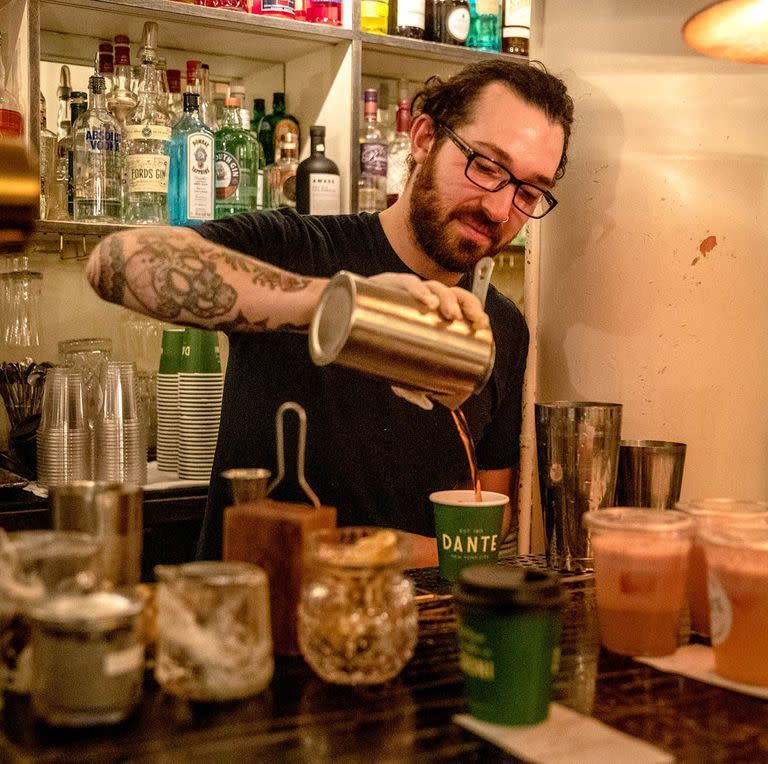
Happy hour, he notes, is entirely different these days, and yet, much the same.
“I feel that our work takes on a whole new meaning at this time. We’ve always been about serving people. We’ve always been about looking after people. But that role for restaurants and bars right now is at a whole different level,” he says. “There’s so much shit that people go on with when times are good. But when—sorry, s’cuse my French—but when the shit hits the fan, the real fortitude of the human race comes out, and it’s been incredible to see that.”
Victoria James, sommelier at famed Korean steakhouse Cote in New York City, already misses her customers, many of whom are familiar faces that she lost when the restaurant closed last week. “I know it’s technically a ‘non-essential’—by no means are restaurants as important as hospitals—but it brings people together,” she says of her city’s bar and restaurant scene. “Food and wine, those are international languages, and it’s a community, so to lose that is really devastating for so many people—not just financially.”
A post shared by COTE (@cote_nyc) on Mar 24, 2020 at 6:00am PDT
At Cote, around 10 people of the formerly 100 remain on staff to make to-go packages of steak for take-out and delivery; James is curating wine experiences to go along with them, the most popular of which has been a hand-selected bottle of rare wine with extensive tasting notes and backstory written by James, priced at $200 during the pandemic but normally $500 on the Cote menu. She says that the proceeds from this steak-and-wine service will go towards keeping the restaurant alive; Cote owner Simon Kim also started a GoFundMe for emergency relief for the employees Cote had to lay off. James says they’ll keep going as long as they can, but it’d be near impossible to stay solvent without some sort of government action to support the industry as they come up on tax and rent payments.
“I think there has to be,” she said. “If not, it’s not just Cote. It’s restaurants as we know it in New York will cease to exist. The beauty of the New York dining scene and restaurants is that it’s so diverse, and there’s so many different people from different backgrounds, all these mom and pop restaurants. But if the government doesn’t help us, then we’re just going to be left with big chain restaurants.” And to lose bars to government inaction would be a smack, too. “New York watering holes are essential to our fabric. If we lose them, it’s a really sad part of New York that we’re losing.”
Since we talked last Monday, Bell’s PDT became one of those watering holes (albeit a very nice one) to close. Bell posted on Instagram, “After Governor Cuomo’s announcement suspending non-essential business, we’ve decided to discontinue our cocktail service. They are delicious, however, arguably not essential.”
“I don’t want people to come back from this and think it’s going to be like New Orleans in New York,” he told me the week before. “[But] when we come back, they’re going to have to figure out how to adapt the pre-existing laws into something that can help boost revenue for people, because we’re going to have eight weeks or more of revenue loss. So whatever they can do to help us is less that they’re going to have to give us later.”
Maybe a plan could be relaxing those liquor laws permanently to give PDT and the like a “creative” method of pulling in sales from local drinkers, as Bell called it. Pride over at Dante thinks it’d be great to continue to supply folks with cocktails at home after this is all over. That’s pending some sort of government support on their behalf so there is an after. “The thing is, basically I would have to choose to pay my staff or the rent,” Pride told me. He continued, “I understand the mechanics of it: If we don’t pay the rent, the landlord can’t pay his mortgage and he defaults, and they can’t run their building and so on and so forth. I understand all that. But there has to be a moratorium on rent or a moratorium on how these landlords are able to service their debt.” Otherwise, he said, speaking of his staff, “All these people are working for free, and all we’re doing is paying the landlord.”
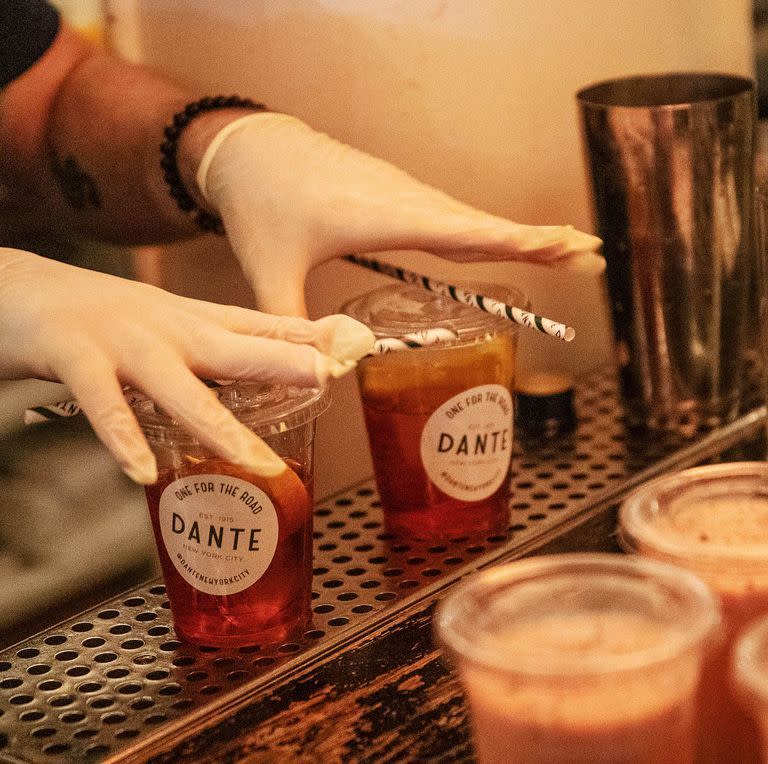
Their calls are echoed across the industry, across the country. The Senate just passed a relief bill that would give some forgiveable loans to small businesses to help with expenses, if they keep employees on payroll; over 3 million Americans have already filed unemployment claims. Now it makes its way to the House, and then onto the White House.
Pride told me a story about a neighbor to the bar named Jo, an old Pan Am flight attendant in her mid-80s who’s a bar regular on Fridays. A few days ago, she came down to Dante (even though he told her not to leave the house), handed him a handwritten note with a hundred bucks inside, and as he recalls it, said to him, “I went through 9/11. I’ve seen this city get shut down, and the only way we were able to come together was really to come into our local favorite restaurants. Right now I feel helpless because we’re being shut down on a similar scale, but we’re not able to come together in a same way that we were then.” Then she said, “I just couldn’t bear to see it if we lost you guys, if we lost Dante from this block.” They both cried a little.
A lot of us are grateful for the bars that have kept us tipsy and in high spirits during good times, or kept us company in the bad. It’s a really bad time right now in America, and so we throw the bucks we can spare to the bars that stand open near our homes for some to-go cocktails and bottles of wine, tip heavily, then have a drink in our self-isolation bunkers. But gratitude, and fortitude with it, can only get them so far when the rent is due on April 1.
You Might Also Like

